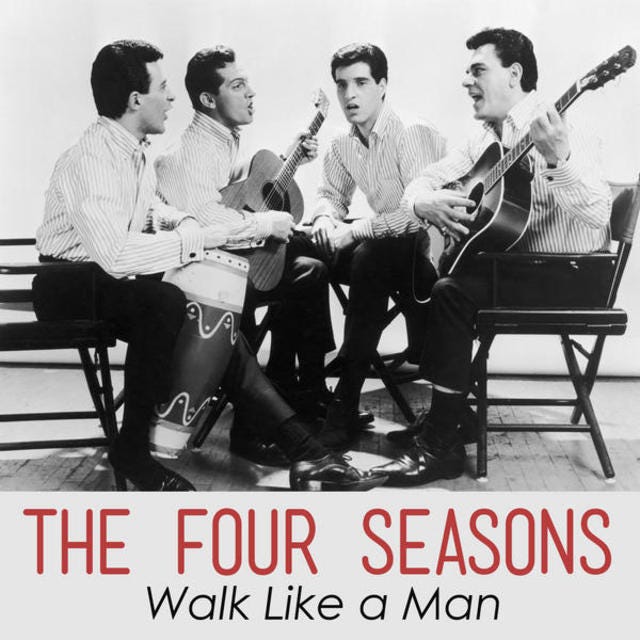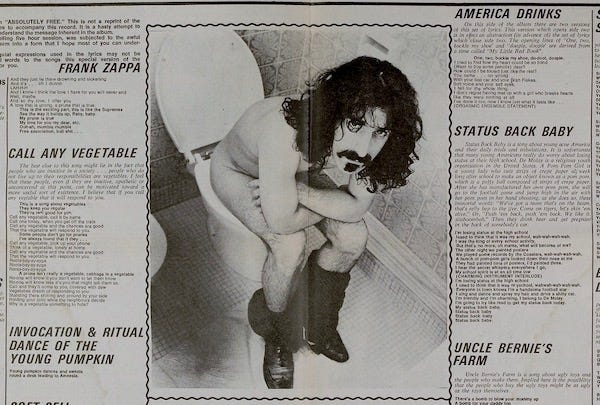The Arts Fuse Newsletter, April 3
Frank Zappa's "Plastic People," 'Limitarianism," Palestinian-Israeli documentaries on the appropriation of land in the West Bank, and April Short Fuses
From The Editor's Desk:
The song “Walk Like a Man” kept running through my head as I read Matthew Beaumont’s How We Walk: Franz Fanon and the Politics of the Body (Verso Books). Theater critics are particularly sensitive to posture, to the ways performers shape characterization through the way they hold themselves — do they stroll across the stage with a commanding stride or an insecure mince? There is a rich history of comedic actors indulging in silly walks well before Monty Python established the Ministry.
Fanon, a Francophone Afro-Caribbean psychiatrist and Marxist philosopher best known for 1961’s The Wretched of the Earth, argued that injustice seeps into the body and warps it, that the pressures exerted by domination, exploitation, and harassment influences the ways that people walk. In “opposition to the abject gait” of the racially and economically marginalized, Fanon envisioned “an upright gait” made possible by a “properly post-colonial, post-capitalist society,” the fruits, according to Beaumont, of a “radical new humanism.” This notion of an ‘orthopedic politics’ had first been theorized by the Jewish philosopher Ernest Bloch, who posited the possibility of a utopia in which everyone would be able to walk with their head high. Who knew?
The view that social conditions can shape our stride proffers considerable appeal: Garnette Cadogan’s influential essay “Walking While Black” is rooted in that notion. But Fanon’s ideal of an “upright posture” is vulnerable to charges of ableism and sexism. Walk like a man? Algerian writer Assia Djebar pointed out that women — once they were free to remove their veils — did not stride along the streets with liberated pride. Instead, their “gait becomes stiff, the step hasty, the facial expression tightens.”
For Beaumont, the time we will all feel comfortable enough to walk tall lies in the future. Before then, we should “fight for a society in which, because the current conditions of material exploitation and social oppression will have been collectively, systematically abolished, everybody is free to loosen or soften their facial expression and to walk the streets both as fluidly as they are able and as unhurriedly as they like.”
—Bill Marx, Editor-in-Chief
Music Commentary: A Deep Dive into The Mothers of Invention’s “Plastic People”
By Trevor Fairbrother
Frank Zappa’s tight editing ensured that “Plastic People” was a compelling aural creation, and his fierce confidence compelled listeners to pay attention to the words.
Theater Review: “Mrs. Krishnan’s Party” — Daal M for Merriment
By David Greenham
Let’s face it, we could all use a celebration of renewal and togetherness that crosses cultural (and political) borders
Film Review: “No Other Land” — In The West Bank, Seizing Land and Smashing Cameras
By David D’Arcy
Watch Five Broken Cameras as No Other Land finds its way to festivals beyond Berlin. By then, the forced displacement of people in the West Bank will look gentle compared to the relentless siege of Gaza.
Book Review: “Limitarianism” — An Idea Whose Time Has Come
By Ed Meek
In this pointed book about the harm done by the super-rich, Ingrid Robeyns is out to convince us that limiting wealth, and reallocating it, will result in a better life for all of us.
Music Festival Review: 11 for 11 — Highlights of Big Ears 2024
By Noah Schaffer
‘More than cool ‘was the defining ethos at this year’s Big Ears Festival, a sprawling, sold-out festival that finds a dozen venues running concurrently over four days and nights.
Music Commentary: A Mystery Solved on the 50th Anniversary of the Release of “Queen II”
By Adam Ellsworth
The lyrics to the song on Queen II about the painting “The Fairy Feller’s Master-Stroke”) originate from a poem Richard Dadd wrote about his picture. What’s never been established though is exactly how Freddie Mercury became aware of this poem.
April Short Fuses — Materia Critica
Compiled by Arts Fuse Editor
Each month, our arts critics — music, book, theater, dance, television, film, and visual arts — fire off a few brief reviews.
Help Keep The Arts Fuse Lit!
Precious few independent online arts publications make it to double digits. Please give us the resources the magazine needs to persevere at an essential cultural task.
Keep the Fuse lit and support our 70+ writers by making a donation.
The Arts Fuse also needs underwriting for the magazine to continue to grow.
And…tell your friends about the in-depth arts coverage you can’t get anywhere else.
Questions, comments, concerns?
Editor-in-Chief
Bill Marx
wmarx103@gmail.com













